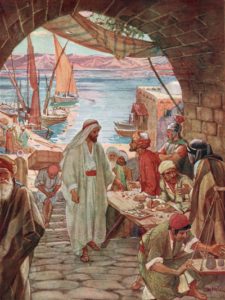Scripture:
1 Samuel 9:1-4, 17-19; 10:1a
Mark 2:13-17
Reflection:
“Those who are well do not need a physician, but the sick do. I did not come to call the righteous but sinners” (v.17).

In these two simple verses, Jesus invites the reader – you and me –to ask ourselves the questions: Am I sick or am I well? Am I righteous, or am I a sinner? Reflecting on the text, I couldn’t help but feel that Jesus’ use of righteousness in this case seems negative, pointing to the inability of the Pharisees to see truth. Yet, several verses in the Old and New Testaments offer righteousness as a virtuous trait. One of these examples is in Paul’s First Letter to Timothy; he encourages the community to “ ..pursue righteousness, devotion, faith, love, patience and gentleness” (6:11). Webster’s dictionary defines righteousness as “holiness, purity of heart, uprightness” …etc. If all this is true, what do we make of Jesus’ answer to the Pharisees? Perhaps it is not so much a negative comment on pursuing holiness and purity of heart as a lack of recognition that we are all sinners as we strive for those virtuous traits.
What strikes me is how I immediately react negatively to the Pharisee’s question. Does the question have to be a criticism of Jesus’ actions? Given the Torah (Law), dining with “tax collectors and sinners” would make the observant Jew ritually unclean. To better understand, it is always good to question matters of faith; perhaps it was an earnest question. However, it is even better to recognize the truth of Jesus’ answer. True righteousness and purity of heart without the taint of power to protect should see truth.
The readings today offer an opportunity for reflection on human motivation and behavior. The First Book of Samuel speaks of the election of Saul as God’s chosen king to lead the Israelites. God called Saul. Samuel will be the last in a long line of judges in Israel. A new era begins that will ultimately herald the birth of the Messiah from the line of King David.
Sadly, as a result of his behavior, Saul’s reign is short-lived, and he would be succeeded (ousted, really) by David. Saul, it might be said, started righteously and was very successful because of this trait. He then wanted power for himself, and it ended badly for him.
In our gospel, Jesus called “Levi” the tax collector, a person considered a sinner. Yet, the sinner recognized Jesus as righteous, and the text tells us that he left everything immediately and followed him. Here is the beginning of righteousness.
In reality, Jesus is the final statement on righteousness in his behavior because he was motivated by love to the end. Unlike Saul, he kept his heart pure and true. As his followers, we do no less.
To return to my original questions. Yes, I am both well and sick. I am righteous and a sinner all at the same time. The trick is recognizing our need for our divine physician to heal and forgive us. We make sure that happens by safeguarding our relationship with Jesus.
May this New Year dawn brightly and herald a new day of righteousness in Christ Jesus for all. Amen.
Jean Bowler is a retreatant at Mater Dolorosa Passionist Retreat Center in Sierra Madre, California, and a member of the Office of Mission Effectiveness Board of Holy Cross Province.
